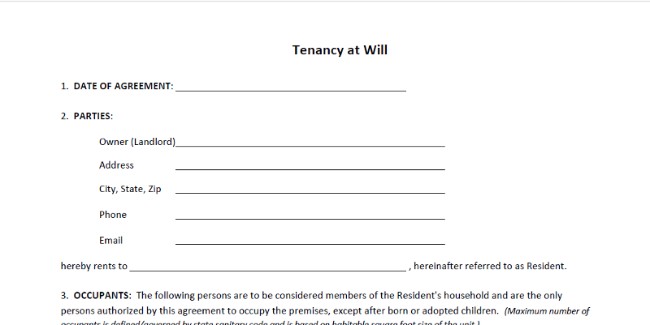Pros and Cons of the Massachusetts Month-to-Month Rental Agreement
| . Posted in advice, News - 13 Comments
In Massachusetts, a month-to-month rental agreement is called a “tenancy at will.” Either landlord or tenant can end the agreement whenever they want.

The MassLandlords month-to-month agreement is six pages long. Members get access to Word files and our optional clauses to customize the agreement to your business.
Terminology
Sometimes landlords say they’re looking for a “month to month lease.” A lease is always for a fixed term, usually greater than six months. It’s better to call it a month-to-month “rental agreement,” not a lease.
Advantages of a Month-to-Month Rental Agreement
First, month-to-month’s are flexible. You can end the tenancy after giving notice in advance, either thirty days or one full rental period, whichever is longer. For instance, if you want to end the tenancy at midnight on August 1, then you can issue your notice-to-quit anytime in June. (Note that notices cannot be served off-hours. Best practice is to follow the court schedule and serve notices only when court is open.)
Second, month-to-month’s are private. A landlord can end the tenancy without pointing to a specific reason. You could want the premises for renovation, or for a family member, or for yourself. You don’t have to say why. It could be because you have experienced a long string of behavioral challenges with the tenant. Pick any one of them and it wouldn’t be an evictable offense, but put them all together, combined with your failure to mediate or make things better, and you’ve just had enough. A month-to-month lets you get out of the arrangement without contest.
Third, a Massachusetts month-to-month agreement should command higher rent than the equivalent lease. Consider that your rent levels should be set to ensure profitability assuming some vacancy rate, like 5% or 10%. Which rate you use depends on your business. Since month-to-month tenants are more likely to move off-season and create more vacancy, month-to-month agreements should legitimately cost a tenant more in rent.
Fourth and finally, month-to-month agreements let you be lazy. There is no need to track when the agreement ends, and no stress about missing renewal dates. Many landlords let their month-to-month tenants live in their premises for as long as they please. Some deliberately don’t raise the rent – ever – as a strategy to keep tenants for ten years or more. This drives vacancy loss to less than 1%, and generally drives labor cost and repairs down, as well. When everyone has become familiar with the routine, there is less call for change or improvement.
Disadvantages of a Month-to-Month Rental Agreement
First, the primary disadvantage is winter vacancy. Month-to-month tenants have a habit of moving away at the worst possible time. Fewer people are looking to rent starting mid-winter. This means you may have a longer vacancy and/or may have to lower the rent. There will be fewer qualified applicants than during peak season (spring or fall). Also, your apartment will get dirty. People will track in ice, snow, sand, and salt during their tours. Winter vacancy requires careful management to reduce your costs.
Second, a month-to-month agreement makes it easy to forget to raise the rent. As stated above, some landlords purposefully do not increase the rent for decades. But if that’s not your style, you need to set yourself a reminder to do it. If you don’t remind yourself, the tenant won’t. It’s not like their lease is expiring and if they don’t remind you to sign a new one, they won’t have a home. Tenants on a month-to-month already have everything they need.
Third, a month-to-month makes it legally harder to raise the rent. In contract law, you must offer “consideration” (read: money) to get someone to sign away something they already have. A tenant with a month-to-month already has an indefinite claim on your property at a certain price. If you want to raise the price, you need to terminate their tenancy. This is a confrontational approach to raising the rent. Either that or you need to offer them something, like permission to have another pet, or a gift card, or a new ceiling fan.
Fourth and finally, if you advertise your willingness to sign a month-to-month, you will attract less stable tenants. Tenants who know they may soon move will take advantage of your flexibility. It’s not unheard of to have tenants rent a place for just one month, or just three months. This can happen even if they tell you that they intend to rent for a year. Dealing with frequent turnover is a special skill that requires good relationships with cleaning services and aggressive marketing practices to keep costs down.
Interesting tidbits
You can sign a month-to-month rental agreement in Massachusetts with longer-term commitments. For instance, if you are unsure of a tenant’s ability to comply with house rules, you might want to offer a month-to-month with a clause that you won’t seek to raise the rent on that tenant for the first 12 months. This gives you the freedom to terminate for misbehavior, while assuring the tenant that they can count on the price as advertised. This approach can make a month-to-month work for everyone.
Note that if you are very wise, you can construct a lease to cover all of the behaviors you want the tenant to exhibit. Trash removal, quiet hours, pet cleanliness and more can all be contemplated. If any of these rules are not followed, you can evict “for cause” just as quickly as if you had a month-to-month.
Download a Month-to-Month Rental Agreement
Our forms are available for members to download at MassLandlords.net/forms. Scroll down to Step Two: Agreements and search for “tenancy at will.” This is the legal term for a “month to month.” Good luck!
Members also can ask experienced landlords for advice and search our directory for attorney referrals.




